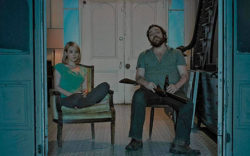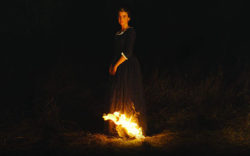A24 is on quite a roll. The independent entertainment company celebrated an Oscar win with Moonlight, and its horror output—highlighted by The Witch and Green Room—has been top-notch. Now, writer-director Trey Edward Shults (Krisha) invites audiences into the nightmarish apocalypse of It Comes at Night, an intense vision of what one family will do to survive.
The film has been prematurely hailed as the latest feature to save the sagging horror genre, an oft-repeated mantra that frankly is a lie—actual fake news. Horror is in stunningly good health, thanks in part to A24, and does not need Shults to save it with his fragmentary vision of what could be another family man’s experience on a road adjacent to that of Cormac McCarthy.
In a dark fortress of a house, Paul (Joel Edgerton, whose The Gift was a satisfying slice of domestic fear) and his family—wife Sarah (Carmen Ejogo) and teenage son Travis (Kelvin Harrison Jr.)—are riding out an outbreak of a dangerously contagious disease. At least, that is what audiences must assume; Shults is fairly stingy with exposition, a risky narrative decision as capable of earning critical accolades as leaving an audience unnecessarily confused and unsatisfied.
In It Comes at Night, the decision forces audiences to rely upon Paul’s word. Sure, the film opens with his afflicted father-in-law’s sad demise, but perhaps the rest of the world is not as bad off as this potential doomsday prepper believes. When a younger, stronger man attempts to break into Paul’s kingdom, secured behind a high-gloss red door, he fears the worst. It turns out Will (Christopher Abbott, Charlie of “Girls”) is a father just looking for the means to save his own family (including Riley Keough of Mad Max: Fury Road). As we learn, good intentions do not mean much when the real horror is humanity.
Not showing the horror is one thing, and a false truth has become accepted that a greater film does not have to stoop so low as to explicitly depict its horrors. While such restraint can certainly heighten tension in the right hands, it can as often lead to frustration and disappointment, which is much worse for word of mouth. It Comes at Night makes the most of some frightening natural imagery—those gnarled tree roots are the stuff of nightmares—and evocatively lamp-lit darkness, but it also goes beyond not showing the horror. It lacks anything else to show; we know as much after the credits roll as we knew when the trailer ended. The final act is expectedly tense and brutal, but the overly reticent film risks underwhelming audiences expecting to be more terrified based on its hype and a trailer that promises too much.
Like what you just read? Support Flagpole by making a donation today. Every dollar you give helps fund our ongoing mission to provide Athens with quality, independent journalism.










